Politics and Political Economy: Brexit and UK Bargaining Power
VerifiedAdded on 2022/12/15
|9
|2813
|136
Essay
AI Summary
This essay delves into the multifaceted implications of the United Kingdom's departure from the European Union, with a specific focus on the consequential reduction in the UK's bargaining power. The analysis begins by highlighting the advantages the UK enjoyed as a member of the EU, particularly in terms of trade agreements and economic influence. The essay then explores how Brexit has diminished this power, including the loss of free trade agreements, the imposition of tariffs, and the resulting economic volatility. The fluctuating value of the pound, the decline in the UK's car sector, and the impact on the financial services sector are examined as concrete examples. The essay also considers the political arguments surrounding Brexit, including debates about national sovereignty and economic competitiveness, and the role of key figures. The essay further evaluates the economic forecasts and the impact on GDP growth, unemployment, and inflation. The impact of Brexit on trade agreements, including the likely decrease in overall UK trading products and services, are also analyzed. The essay concludes with a discussion of the UK's options and the potential challenges the UK faces in negotiating post-Brexit trade agreements and maintaining its global influence. The essay underscores the complexities and far-reaching consequences of Brexit on the UK's economic and political landscape.
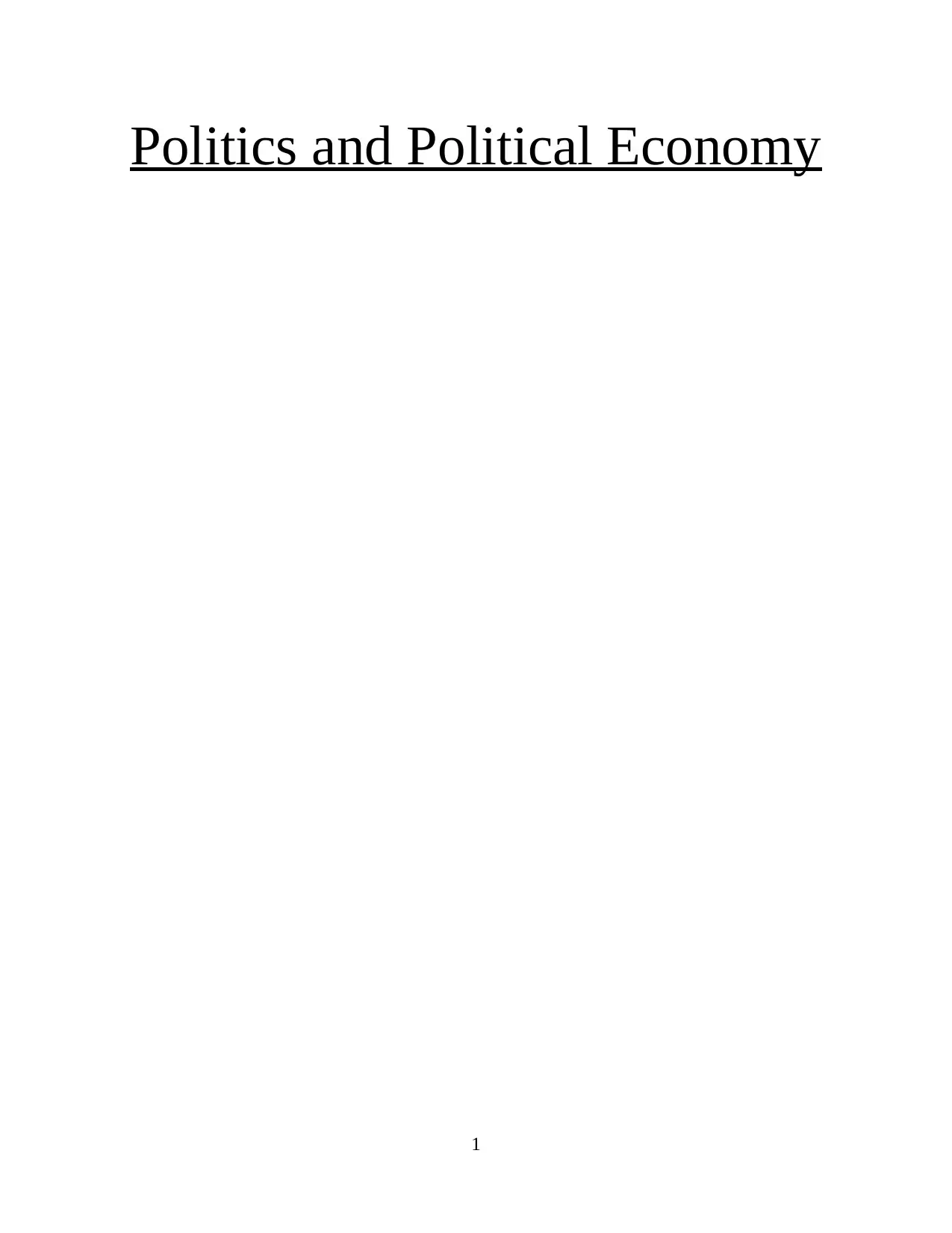
Politics and Political Economy
1
1
Paraphrase This Document
Need a fresh take? Get an instant paraphrase of this document with our AI Paraphraser
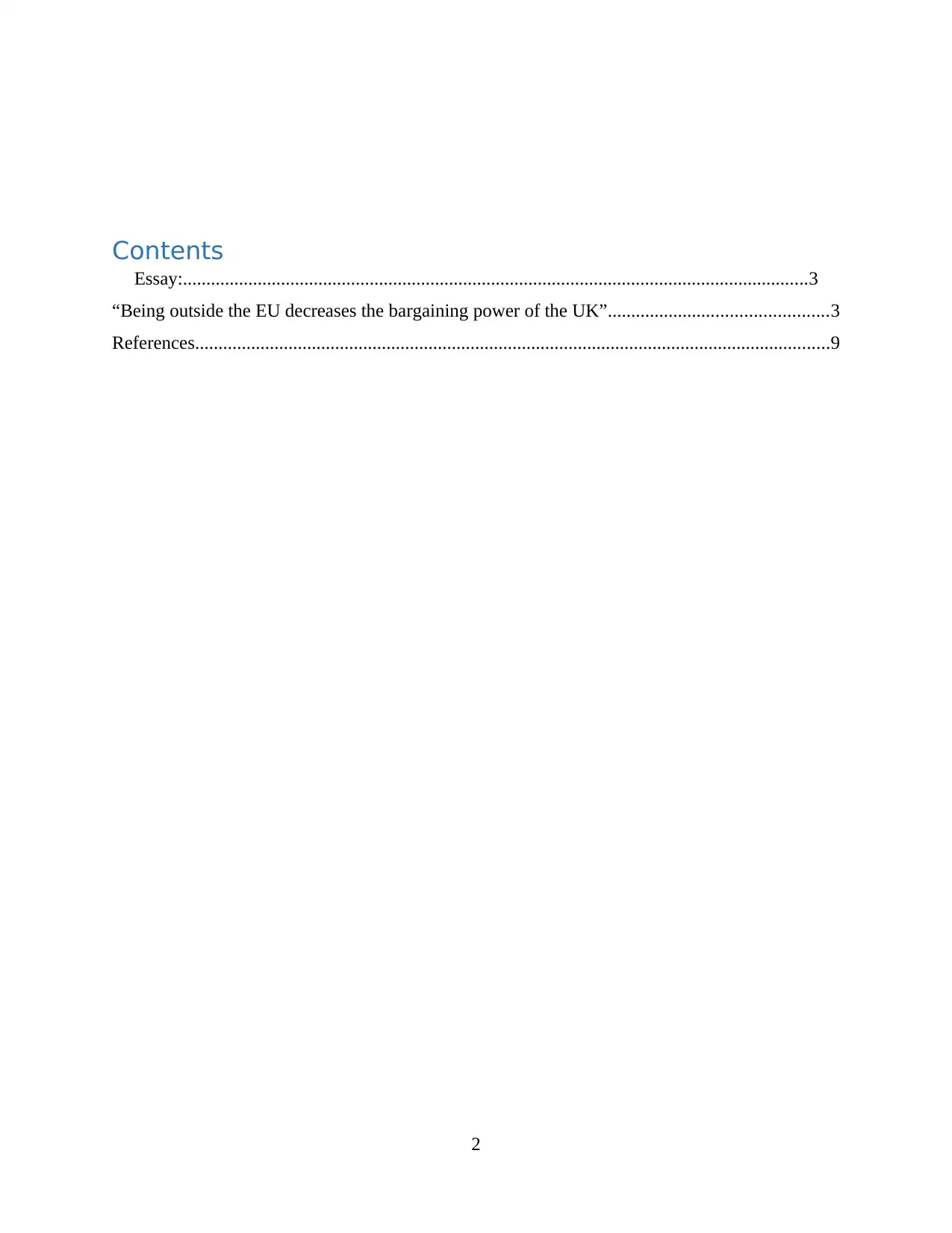
Contents
Essay:......................................................................................................................................3
“Being outside the EU decreases the bargaining power of the UK”...............................................3
References........................................................................................................................................9
2
Essay:......................................................................................................................................3
“Being outside the EU decreases the bargaining power of the UK”...............................................3
References........................................................................................................................................9
2
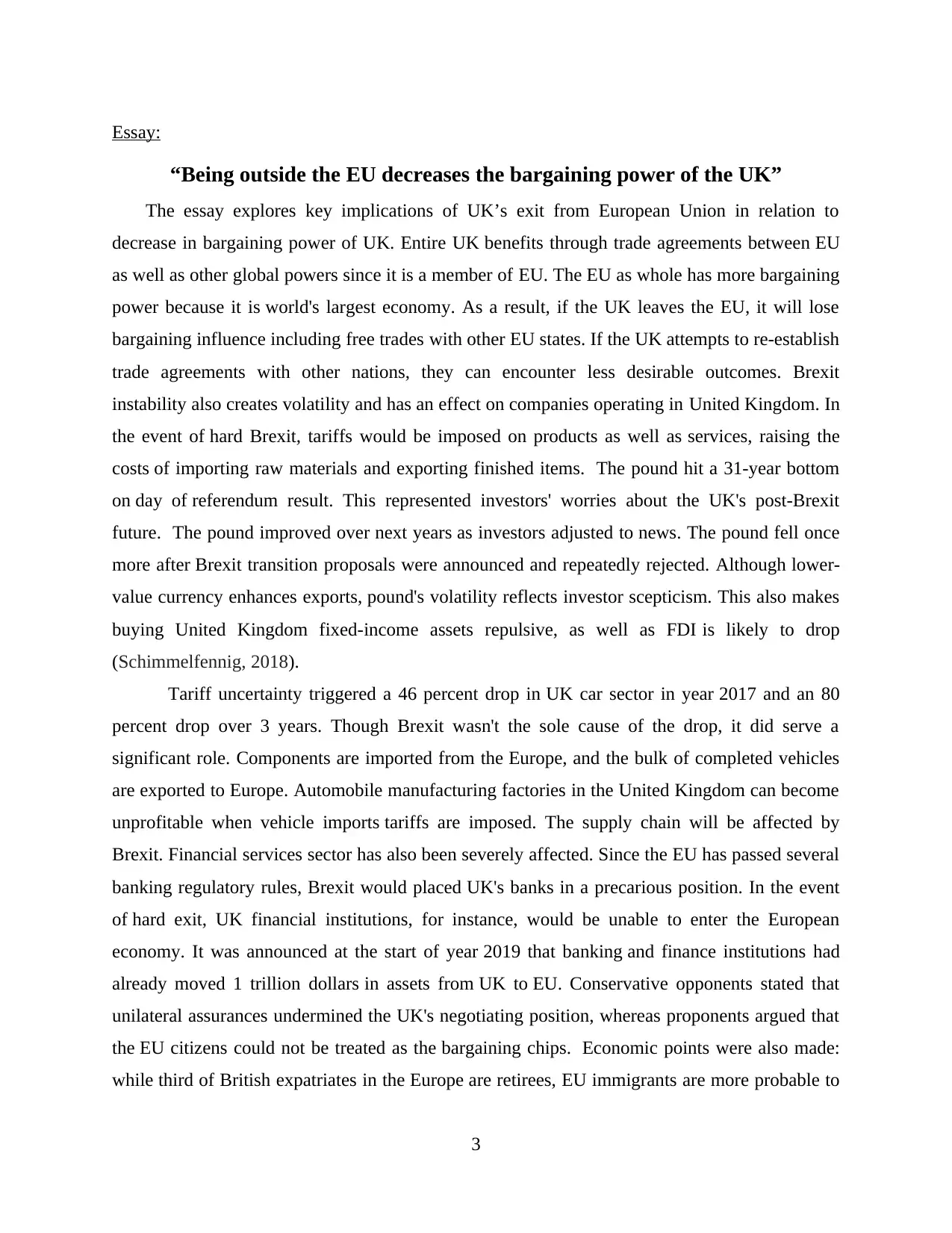
Essay:
“Being outside the EU decreases the bargaining power of the UK”
The essay explores key implications of UK’s exit from European Union in relation to
decrease in bargaining power of UK. Entire UK benefits through trade agreements between EU
as well as other global powers since it is a member of EU. The EU as whole has more bargaining
power because it is world's largest economy. As a result, if the UK leaves the EU, it will lose
bargaining influence including free trades with other EU states. If the UK attempts to re-establish
trade agreements with other nations, they can encounter less desirable outcomes. Brexit
instability also creates volatility and has an effect on companies operating in United Kingdom. In
the event of hard Brexit, tariffs would be imposed on products as well as services, raising the
costs of importing raw materials and exporting finished items. The pound hit a 31-year bottom
on day of referendum result. This represented investors' worries about the UK's post-Brexit
future. The pound improved over next years as investors adjusted to news. The pound fell once
more after Brexit transition proposals were announced and repeatedly rejected. Although lower-
value currency enhances exports, pound's volatility reflects investor scepticism. This also makes
buying United Kingdom fixed-income assets repulsive, as well as FDI is likely to drop
(Schimmelfennig, 2018).
Tariff uncertainty triggered a 46 percent drop in UK car sector in year 2017 and an 80
percent drop over 3 years. Though Brexit wasn't the sole cause of the drop, it did serve a
significant role. Components are imported from the Europe, and the bulk of completed vehicles
are exported to Europe. Automobile manufacturing factories in the United Kingdom can become
unprofitable when vehicle imports tariffs are imposed. The supply chain will be affected by
Brexit. Financial services sector has also been severely affected. Since the EU has passed several
banking regulatory rules, Brexit would placed UK's banks in a precarious position. In the event
of hard exit, UK financial institutions, for instance, would be unable to enter the European
economy. It was announced at the start of year 2019 that banking and finance institutions had
already moved 1 trillion dollars in assets from UK to EU. Conservative opponents stated that
unilateral assurances undermined the UK's negotiating position, whereas proponents argued that
the EU citizens could not be treated as the bargaining chips. Economic points were also made:
while third of British expatriates in the Europe are retirees, EU immigrants are more probable to
3
“Being outside the EU decreases the bargaining power of the UK”
The essay explores key implications of UK’s exit from European Union in relation to
decrease in bargaining power of UK. Entire UK benefits through trade agreements between EU
as well as other global powers since it is a member of EU. The EU as whole has more bargaining
power because it is world's largest economy. As a result, if the UK leaves the EU, it will lose
bargaining influence including free trades with other EU states. If the UK attempts to re-establish
trade agreements with other nations, they can encounter less desirable outcomes. Brexit
instability also creates volatility and has an effect on companies operating in United Kingdom. In
the event of hard Brexit, tariffs would be imposed on products as well as services, raising the
costs of importing raw materials and exporting finished items. The pound hit a 31-year bottom
on day of referendum result. This represented investors' worries about the UK's post-Brexit
future. The pound improved over next years as investors adjusted to news. The pound fell once
more after Brexit transition proposals were announced and repeatedly rejected. Although lower-
value currency enhances exports, pound's volatility reflects investor scepticism. This also makes
buying United Kingdom fixed-income assets repulsive, as well as FDI is likely to drop
(Schimmelfennig, 2018).
Tariff uncertainty triggered a 46 percent drop in UK car sector in year 2017 and an 80
percent drop over 3 years. Though Brexit wasn't the sole cause of the drop, it did serve a
significant role. Components are imported from the Europe, and the bulk of completed vehicles
are exported to Europe. Automobile manufacturing factories in the United Kingdom can become
unprofitable when vehicle imports tariffs are imposed. The supply chain will be affected by
Brexit. Financial services sector has also been severely affected. Since the EU has passed several
banking regulatory rules, Brexit would placed UK's banks in a precarious position. In the event
of hard exit, UK financial institutions, for instance, would be unable to enter the European
economy. It was announced at the start of year 2019 that banking and finance institutions had
already moved 1 trillion dollars in assets from UK to EU. Conservative opponents stated that
unilateral assurances undermined the UK's negotiating position, whereas proponents argued that
the EU citizens could not be treated as the bargaining chips. Economic points were also made:
while third of British expatriates in the Europe are retirees, EU immigrants are more probable to
3
⊘ This is a preview!⊘
Do you want full access?
Subscribe today to unlock all pages.

Trusted by 1+ million students worldwide
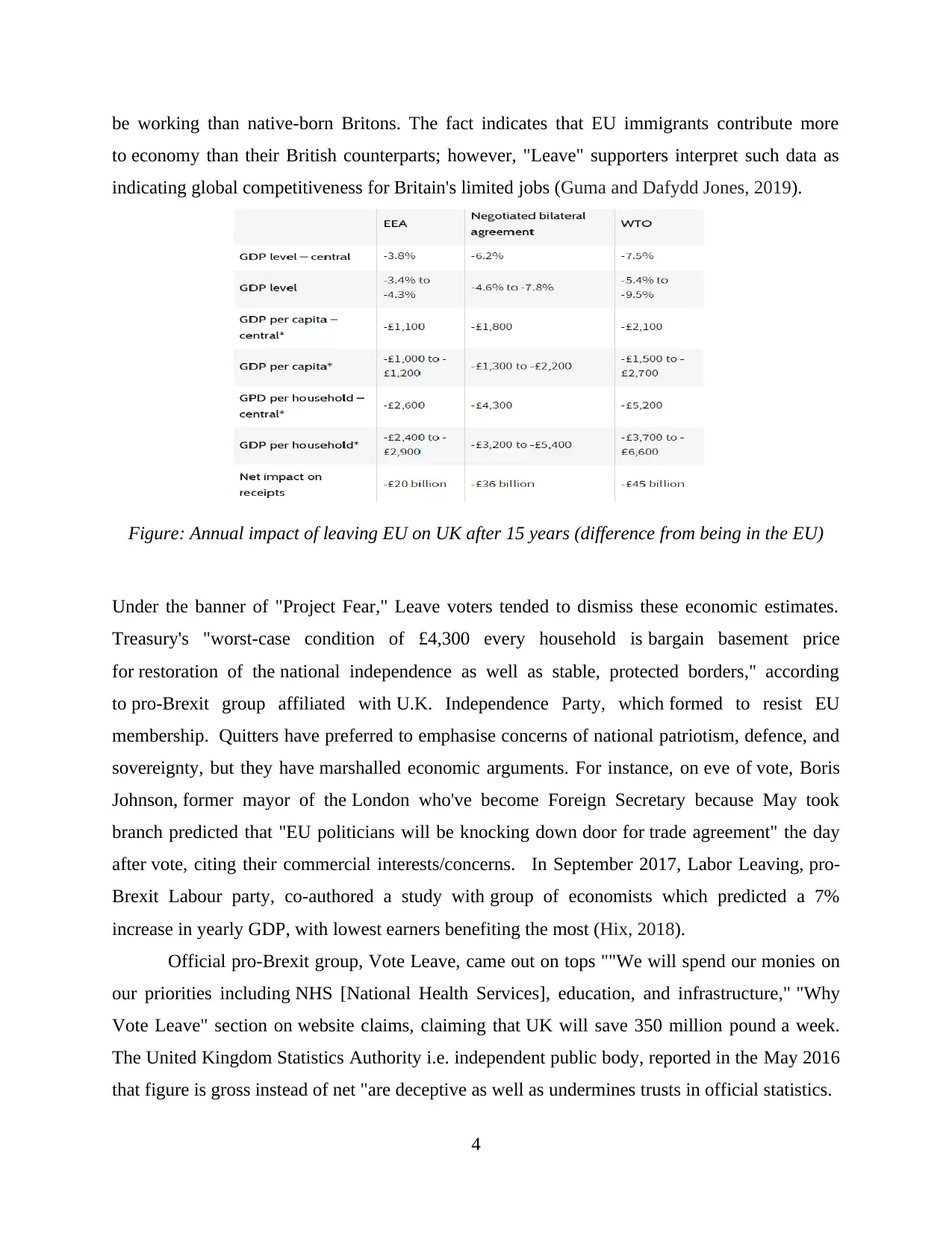
be working than native-born Britons. The fact indicates that EU immigrants contribute more
to economy than their British counterparts; however, "Leave" supporters interpret such data as
indicating global competitiveness for Britain's limited jobs (Guma and Dafydd Jones, 2019).
Figure: Annual impact of leaving EU on UK after 15 years (difference from being in the EU)
Under the banner of "Project Fear," Leave voters tended to dismiss these economic estimates.
Treasury's "worst-case condition of £4,300 every household is bargain basement price
for restoration of the national independence as well as stable, protected borders," according
to pro-Brexit group affiliated with U.K. Independence Party, which formed to resist EU
membership. Quitters have preferred to emphasise concerns of national patriotism, defence, and
sovereignty, but they have marshalled economic arguments. For instance, on eve of vote, Boris
Johnson, former mayor of the London who've become Foreign Secretary because May took
branch predicted that "EU politicians will be knocking down door for trade agreement" the day
after vote, citing their commercial interests/concerns. In September 2017, Labor Leaving, pro-
Brexit Labour party, co-authored a study with group of economists which predicted a 7%
increase in yearly GDP, with lowest earners benefiting the most (Hix, 2018).
Official pro-Brexit group, Vote Leave, came out on tops ""We will spend our monies on
our priorities including NHS [National Health Services], education, and infrastructure," "Why
Vote Leave" section on website claims, claiming that UK will save 350 million pound a week.
The United Kingdom Statistics Authority i.e. independent public body, reported in the May 2016
that figure is gross instead of net "are deceptive as well as undermines trusts in official statistics.
4
to economy than their British counterparts; however, "Leave" supporters interpret such data as
indicating global competitiveness for Britain's limited jobs (Guma and Dafydd Jones, 2019).
Figure: Annual impact of leaving EU on UK after 15 years (difference from being in the EU)
Under the banner of "Project Fear," Leave voters tended to dismiss these economic estimates.
Treasury's "worst-case condition of £4,300 every household is bargain basement price
for restoration of the national independence as well as stable, protected borders," according
to pro-Brexit group affiliated with U.K. Independence Party, which formed to resist EU
membership. Quitters have preferred to emphasise concerns of national patriotism, defence, and
sovereignty, but they have marshalled economic arguments. For instance, on eve of vote, Boris
Johnson, former mayor of the London who've become Foreign Secretary because May took
branch predicted that "EU politicians will be knocking down door for trade agreement" the day
after vote, citing their commercial interests/concerns. In September 2017, Labor Leaving, pro-
Brexit Labour party, co-authored a study with group of economists which predicted a 7%
increase in yearly GDP, with lowest earners benefiting the most (Hix, 2018).
Official pro-Brexit group, Vote Leave, came out on tops ""We will spend our monies on
our priorities including NHS [National Health Services], education, and infrastructure," "Why
Vote Leave" section on website claims, claiming that UK will save 350 million pound a week.
The United Kingdom Statistics Authority i.e. independent public body, reported in the May 2016
that figure is gross instead of net "are deceptive as well as undermines trusts in official statistics.
4
Paraphrase This Document
Need a fresh take? Get an instant paraphrase of this document with our AI Paraphraser
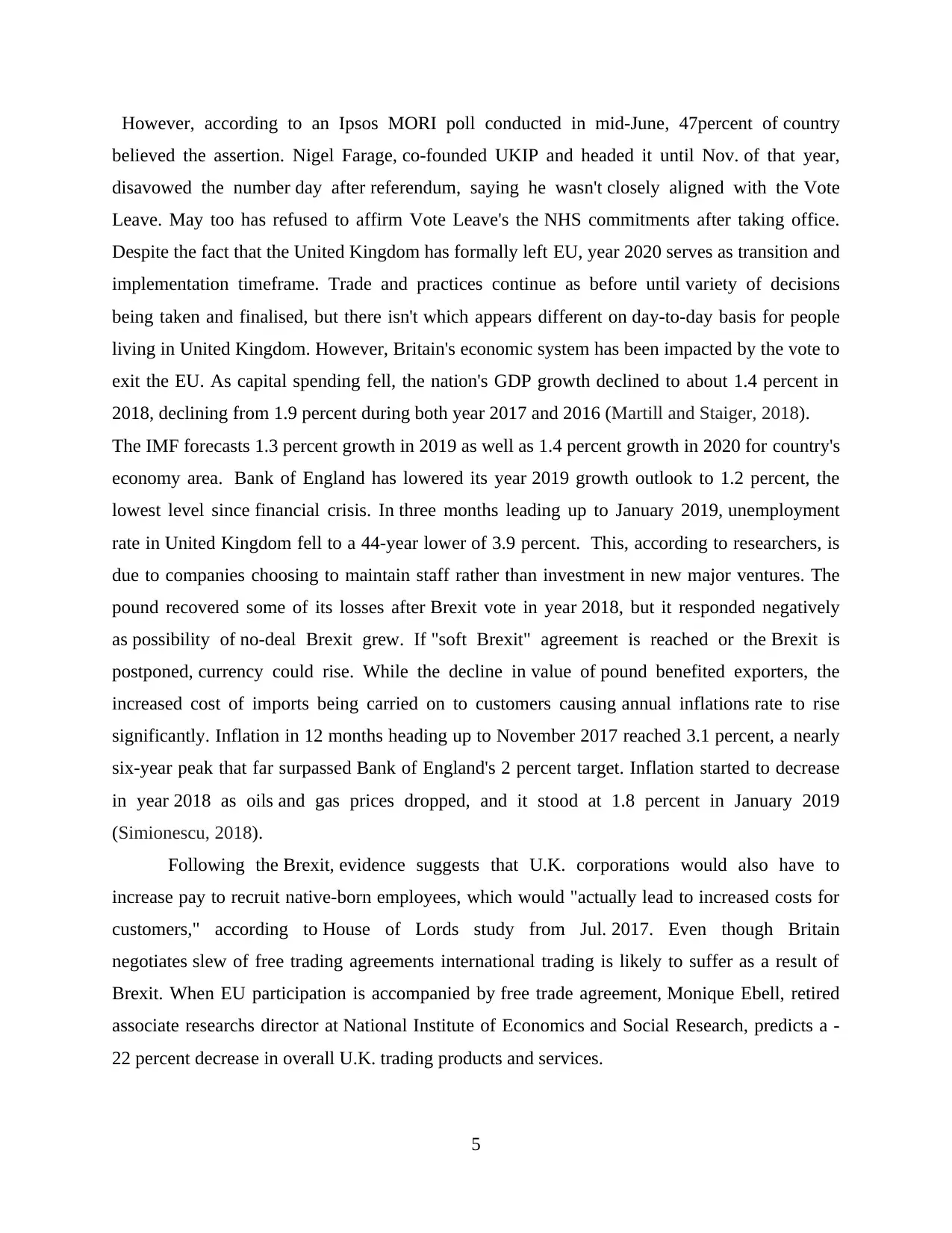
However, according to an Ipsos MORI poll conducted in mid-June, 47percent of country
believed the assertion. Nigel Farage, co-founded UKIP and headed it until Nov. of that year,
disavowed the number day after referendum, saying he wasn't closely aligned with the Vote
Leave. May too has refused to affirm Vote Leave's the NHS commitments after taking office.
Despite the fact that the United Kingdom has formally left EU, year 2020 serves as transition and
implementation timeframe. Trade and practices continue as before until variety of decisions
being taken and finalised, but there isn't which appears different on day-to-day basis for people
living in United Kingdom. However, Britain's economic system has been impacted by the vote to
exit the EU. As capital spending fell, the nation's GDP growth declined to about 1.4 percent in
2018, declining from 1.9 percent during both year 2017 and 2016 (Martill and Staiger, 2018).
The IMF forecasts 1.3 percent growth in 2019 as well as 1.4 percent growth in 2020 for country's
economy area. Bank of England has lowered its year 2019 growth outlook to 1.2 percent, the
lowest level since financial crisis. In three months leading up to January 2019, unemployment
rate in United Kingdom fell to a 44-year lower of 3.9 percent. This, according to researchers, is
due to companies choosing to maintain staff rather than investment in new major ventures. The
pound recovered some of its losses after Brexit vote in year 2018, but it responded negatively
as possibility of no-deal Brexit grew. If "soft Brexit" agreement is reached or the Brexit is
postponed, currency could rise. While the decline in value of pound benefited exporters, the
increased cost of imports being carried on to customers causing annual inflations rate to rise
significantly. Inflation in 12 months heading up to November 2017 reached 3.1 percent, a nearly
six-year peak that far surpassed Bank of England's 2 percent target. Inflation started to decrease
in year 2018 as oils and gas prices dropped, and it stood at 1.8 percent in January 2019
(Simionescu, 2018).
Following the Brexit, evidence suggests that U.K. corporations would also have to
increase pay to recruit native-born employees, which would "actually lead to increased costs for
customers," according to House of Lords study from Jul. 2017. Even though Britain
negotiates slew of free trading agreements international trading is likely to suffer as a result of
Brexit. When EU participation is accompanied by free trade agreement, Monique Ebell, retired
associate researchs director at National Institute of Economics and Social Research, predicts a -
22 percent decrease in overall U.K. trading products and services.
5
believed the assertion. Nigel Farage, co-founded UKIP and headed it until Nov. of that year,
disavowed the number day after referendum, saying he wasn't closely aligned with the Vote
Leave. May too has refused to affirm Vote Leave's the NHS commitments after taking office.
Despite the fact that the United Kingdom has formally left EU, year 2020 serves as transition and
implementation timeframe. Trade and practices continue as before until variety of decisions
being taken and finalised, but there isn't which appears different on day-to-day basis for people
living in United Kingdom. However, Britain's economic system has been impacted by the vote to
exit the EU. As capital spending fell, the nation's GDP growth declined to about 1.4 percent in
2018, declining from 1.9 percent during both year 2017 and 2016 (Martill and Staiger, 2018).
The IMF forecasts 1.3 percent growth in 2019 as well as 1.4 percent growth in 2020 for country's
economy area. Bank of England has lowered its year 2019 growth outlook to 1.2 percent, the
lowest level since financial crisis. In three months leading up to January 2019, unemployment
rate in United Kingdom fell to a 44-year lower of 3.9 percent. This, according to researchers, is
due to companies choosing to maintain staff rather than investment in new major ventures. The
pound recovered some of its losses after Brexit vote in year 2018, but it responded negatively
as possibility of no-deal Brexit grew. If "soft Brexit" agreement is reached or the Brexit is
postponed, currency could rise. While the decline in value of pound benefited exporters, the
increased cost of imports being carried on to customers causing annual inflations rate to rise
significantly. Inflation in 12 months heading up to November 2017 reached 3.1 percent, a nearly
six-year peak that far surpassed Bank of England's 2 percent target. Inflation started to decrease
in year 2018 as oils and gas prices dropped, and it stood at 1.8 percent in January 2019
(Simionescu, 2018).
Following the Brexit, evidence suggests that U.K. corporations would also have to
increase pay to recruit native-born employees, which would "actually lead to increased costs for
customers," according to House of Lords study from Jul. 2017. Even though Britain
negotiates slew of free trading agreements international trading is likely to suffer as a result of
Brexit. When EU participation is accompanied by free trade agreement, Monique Ebell, retired
associate researchs director at National Institute of Economics and Social Research, predicts a -
22 percent decrease in overall U.K. trading products and services.
5
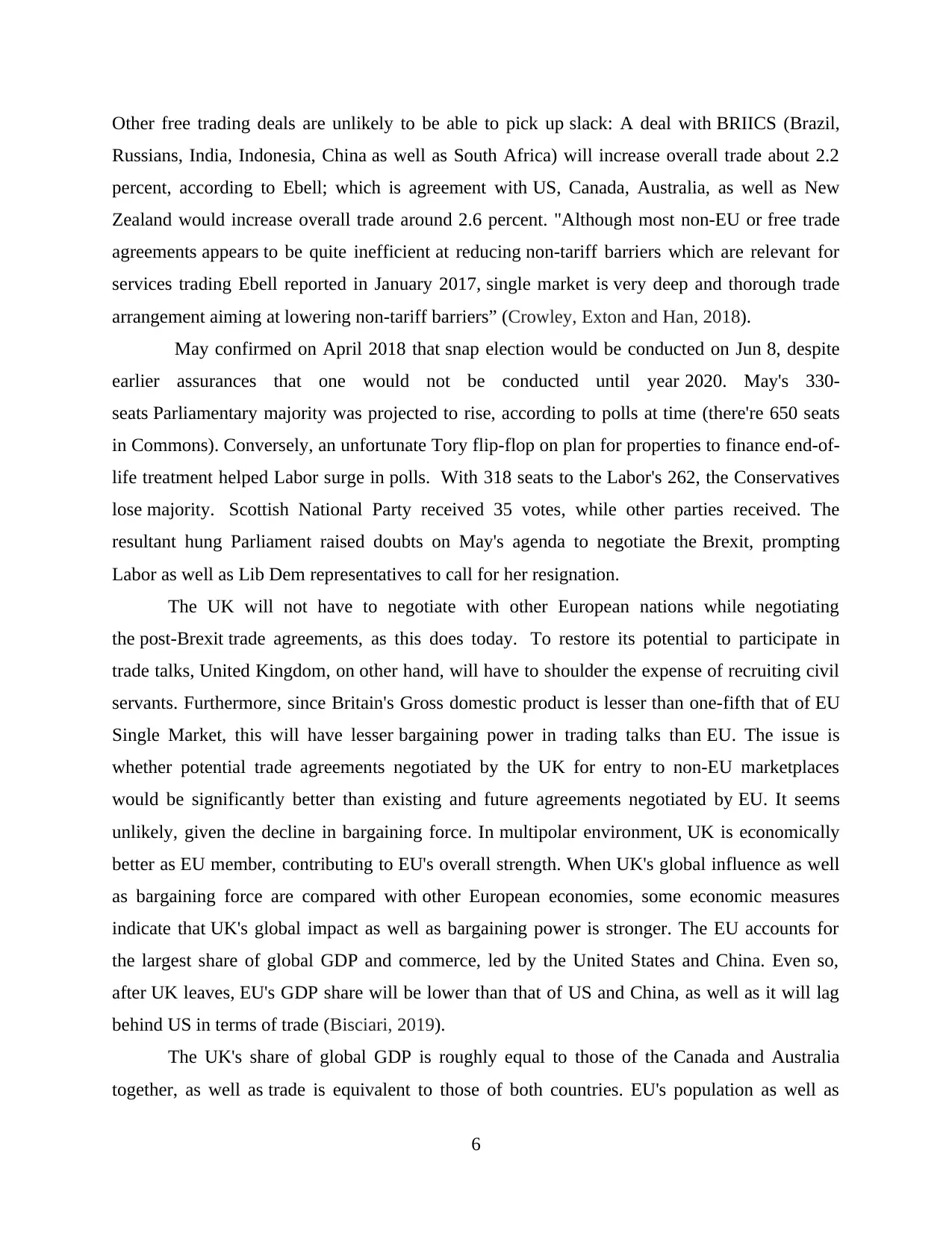
Other free trading deals are unlikely to be able to pick up slack: A deal with BRIICS (Brazil,
Russians, India, Indonesia, China as well as South Africa) will increase overall trade about 2.2
percent, according to Ebell; which is agreement with US, Canada, Australia, as well as New
Zealand would increase overall trade around 2.6 percent. "Although most non-EU or free trade
agreements appears to be quite inefficient at reducing non-tariff barriers which are relevant for
services trading Ebell reported in January 2017, single market is very deep and thorough trade
arrangement aiming at lowering non-tariff barriers” (Crowley, Exton and Han, 2018).
May confirmed on April 2018 that snap election would be conducted on Jun 8, despite
earlier assurances that one would not be conducted until year 2020. May's 330-
seats Parliamentary majority was projected to rise, according to polls at time (there're 650 seats
in Commons). Conversely, an unfortunate Tory flip-flop on plan for properties to finance end-of-
life treatment helped Labor surge in polls. With 318 seats to the Labor's 262, the Conservatives
lose majority. Scottish National Party received 35 votes, while other parties received. The
resultant hung Parliament raised doubts on May's agenda to negotiate the Brexit, prompting
Labor as well as Lib Dem representatives to call for her resignation.
The UK will not have to negotiate with other European nations while negotiating
the post-Brexit trade agreements, as this does today. To restore its potential to participate in
trade talks, United Kingdom, on other hand, will have to shoulder the expense of recruiting civil
servants. Furthermore, since Britain's Gross domestic product is lesser than one-fifth that of EU
Single Market, this will have lesser bargaining power in trading talks than EU. The issue is
whether potential trade agreements negotiated by the UK for entry to non-EU marketplaces
would be significantly better than existing and future agreements negotiated by EU. It seems
unlikely, given the decline in bargaining force. In multipolar environment, UK is economically
better as EU member, contributing to EU's overall strength. When UK's global influence as well
as bargaining force are compared with other European economies, some economic measures
indicate that UK's global impact as well as bargaining power is stronger. The EU accounts for
the largest share of global GDP and commerce, led by the United States and China. Even so,
after UK leaves, EU's GDP share will be lower than that of US and China, as well as it will lag
behind US in terms of trade (Bisciari, 2019).
The UK's share of global GDP is roughly equal to those of the Canada and Australia
together, as well as trade is equivalent to those of both countries. EU's population as well as
6
Russians, India, Indonesia, China as well as South Africa) will increase overall trade about 2.2
percent, according to Ebell; which is agreement with US, Canada, Australia, as well as New
Zealand would increase overall trade around 2.6 percent. "Although most non-EU or free trade
agreements appears to be quite inefficient at reducing non-tariff barriers which are relevant for
services trading Ebell reported in January 2017, single market is very deep and thorough trade
arrangement aiming at lowering non-tariff barriers” (Crowley, Exton and Han, 2018).
May confirmed on April 2018 that snap election would be conducted on Jun 8, despite
earlier assurances that one would not be conducted until year 2020. May's 330-
seats Parliamentary majority was projected to rise, according to polls at time (there're 650 seats
in Commons). Conversely, an unfortunate Tory flip-flop on plan for properties to finance end-of-
life treatment helped Labor surge in polls. With 318 seats to the Labor's 262, the Conservatives
lose majority. Scottish National Party received 35 votes, while other parties received. The
resultant hung Parliament raised doubts on May's agenda to negotiate the Brexit, prompting
Labor as well as Lib Dem representatives to call for her resignation.
The UK will not have to negotiate with other European nations while negotiating
the post-Brexit trade agreements, as this does today. To restore its potential to participate in
trade talks, United Kingdom, on other hand, will have to shoulder the expense of recruiting civil
servants. Furthermore, since Britain's Gross domestic product is lesser than one-fifth that of EU
Single Market, this will have lesser bargaining power in trading talks than EU. The issue is
whether potential trade agreements negotiated by the UK for entry to non-EU marketplaces
would be significantly better than existing and future agreements negotiated by EU. It seems
unlikely, given the decline in bargaining force. In multipolar environment, UK is economically
better as EU member, contributing to EU's overall strength. When UK's global influence as well
as bargaining force are compared with other European economies, some economic measures
indicate that UK's global impact as well as bargaining power is stronger. The EU accounts for
the largest share of global GDP and commerce, led by the United States and China. Even so,
after UK leaves, EU's GDP share will be lower than that of US and China, as well as it will lag
behind US in terms of trade (Bisciari, 2019).
The UK's share of global GDP is roughly equal to those of the Canada and Australia
together, as well as trade is equivalent to those of both countries. EU's population as well as
6
⊘ This is a preview!⊘
Do you want full access?
Subscribe today to unlock all pages.

Trusted by 1+ million students worldwide
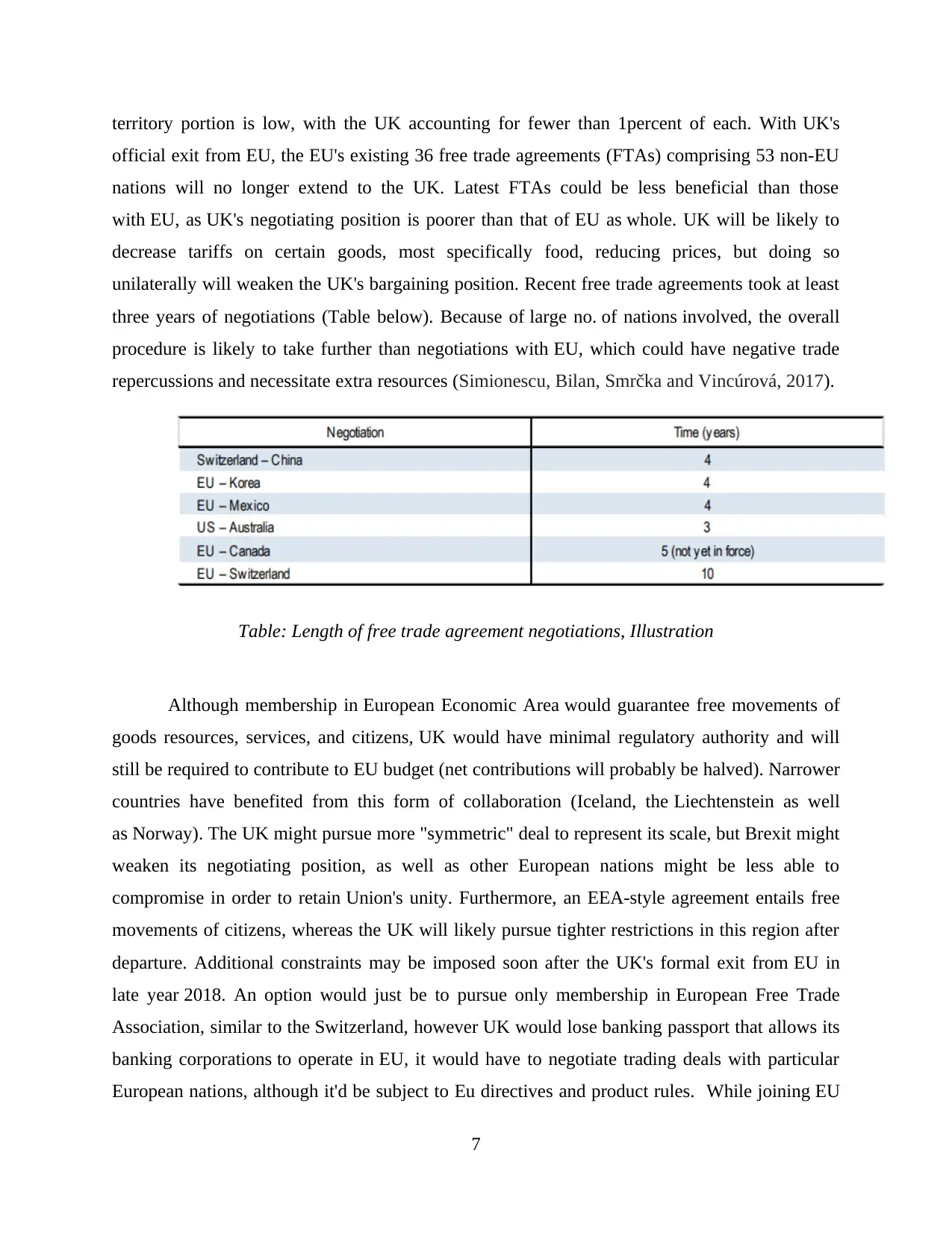
territory portion is low, with the UK accounting for fewer than 1percent of each. With UK's
official exit from EU, the EU's existing 36 free trade agreements (FTAs) comprising 53 non-EU
nations will no longer extend to the UK. Latest FTAs could be less beneficial than those
with EU, as UK's negotiating position is poorer than that of EU as whole. UK will be likely to
decrease tariffs on certain goods, most specifically food, reducing prices, but doing so
unilaterally will weaken the UK's bargaining position. Recent free trade agreements took at least
three years of negotiations (Table below). Because of large no. of nations involved, the overall
procedure is likely to take further than negotiations with EU, which could have negative trade
repercussions and necessitate extra resources (Simionescu, Bilan, Smrčka and Vincúrová, 2017).
Table: Length of free trade agreement negotiations, Illustration
Although membership in European Economic Area would guarantee free movements of
goods resources, services, and citizens, UK would have minimal regulatory authority and will
still be required to contribute to EU budget (net contributions will probably be halved). Narrower
countries have benefited from this form of collaboration (Iceland, the Liechtenstein as well
as Norway). The UK might pursue more "symmetric" deal to represent its scale, but Brexit might
weaken its negotiating position, as well as other European nations might be less able to
compromise in order to retain Union's unity. Furthermore, an EEA-style agreement entails free
movements of citizens, whereas the UK will likely pursue tighter restrictions in this region after
departure. Additional constraints may be imposed soon after the UK's formal exit from EU in
late year 2018. An option would just be to pursue only membership in European Free Trade
Association, similar to the Switzerland, however UK would lose banking passport that allows its
banking corporations to operate in EU, it would have to negotiate trading deals with particular
European nations, although it'd be subject to Eu directives and product rules. While joining EU
7
official exit from EU, the EU's existing 36 free trade agreements (FTAs) comprising 53 non-EU
nations will no longer extend to the UK. Latest FTAs could be less beneficial than those
with EU, as UK's negotiating position is poorer than that of EU as whole. UK will be likely to
decrease tariffs on certain goods, most specifically food, reducing prices, but doing so
unilaterally will weaken the UK's bargaining position. Recent free trade agreements took at least
three years of negotiations (Table below). Because of large no. of nations involved, the overall
procedure is likely to take further than negotiations with EU, which could have negative trade
repercussions and necessitate extra resources (Simionescu, Bilan, Smrčka and Vincúrová, 2017).
Table: Length of free trade agreement negotiations, Illustration
Although membership in European Economic Area would guarantee free movements of
goods resources, services, and citizens, UK would have minimal regulatory authority and will
still be required to contribute to EU budget (net contributions will probably be halved). Narrower
countries have benefited from this form of collaboration (Iceland, the Liechtenstein as well
as Norway). The UK might pursue more "symmetric" deal to represent its scale, but Brexit might
weaken its negotiating position, as well as other European nations might be less able to
compromise in order to retain Union's unity. Furthermore, an EEA-style agreement entails free
movements of citizens, whereas the UK will likely pursue tighter restrictions in this region after
departure. Additional constraints may be imposed soon after the UK's formal exit from EU in
late year 2018. An option would just be to pursue only membership in European Free Trade
Association, similar to the Switzerland, however UK would lose banking passport that allows its
banking corporations to operate in EU, it would have to negotiate trading deals with particular
European nations, although it'd be subject to Eu directives and product rules. While joining EU
7
Paraphrase This Document
Need a fresh take? Get an instant paraphrase of this document with our AI Paraphraser
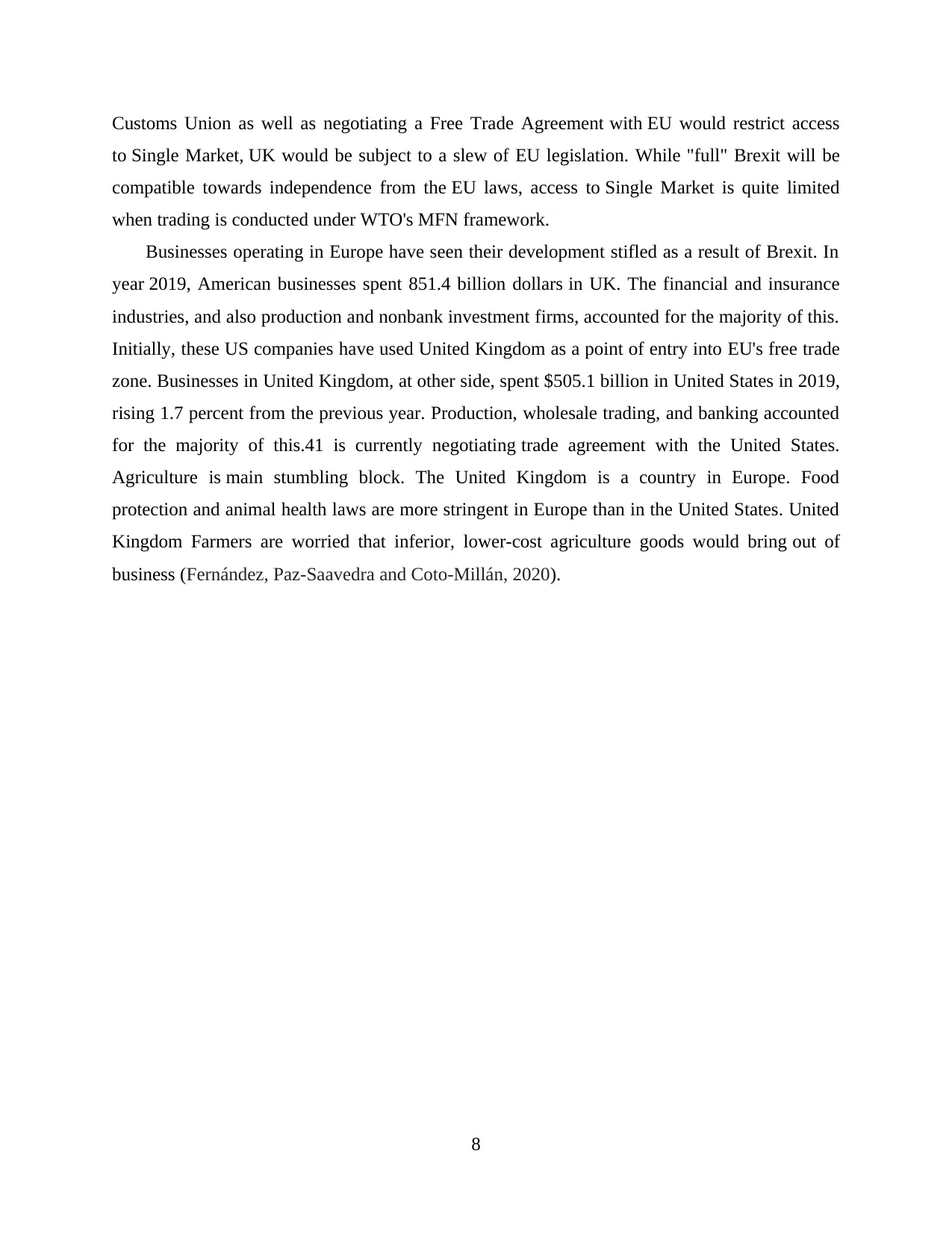
Customs Union as well as negotiating a Free Trade Agreement with EU would restrict access
to Single Market, UK would be subject to a slew of EU legislation. While "full" Brexit will be
compatible towards independence from the EU laws, access to Single Market is quite limited
when trading is conducted under WTO's MFN framework.
Businesses operating in Europe have seen their development stifled as a result of Brexit. In
year 2019, American businesses spent 851.4 billion dollars in UK. The financial and insurance
industries, and also production and nonbank investment firms, accounted for the majority of this.
Initially, these US companies have used United Kingdom as a point of entry into EU's free trade
zone. Businesses in United Kingdom, at other side, spent $505.1 billion in United States in 2019,
rising 1.7 percent from the previous year. Production, wholesale trading, and banking accounted
for the majority of this.41 is currently negotiating trade agreement with the United States.
Agriculture is main stumbling block. The United Kingdom is a country in Europe. Food
protection and animal health laws are more stringent in Europe than in the United States. United
Kingdom Farmers are worried that inferior, lower-cost agriculture goods would bring out of
business (Fernández, Paz-Saavedra and Coto-Millán, 2020).
8
to Single Market, UK would be subject to a slew of EU legislation. While "full" Brexit will be
compatible towards independence from the EU laws, access to Single Market is quite limited
when trading is conducted under WTO's MFN framework.
Businesses operating in Europe have seen their development stifled as a result of Brexit. In
year 2019, American businesses spent 851.4 billion dollars in UK. The financial and insurance
industries, and also production and nonbank investment firms, accounted for the majority of this.
Initially, these US companies have used United Kingdom as a point of entry into EU's free trade
zone. Businesses in United Kingdom, at other side, spent $505.1 billion in United States in 2019,
rising 1.7 percent from the previous year. Production, wholesale trading, and banking accounted
for the majority of this.41 is currently negotiating trade agreement with the United States.
Agriculture is main stumbling block. The United Kingdom is a country in Europe. Food
protection and animal health laws are more stringent in Europe than in the United States. United
Kingdom Farmers are worried that inferior, lower-cost agriculture goods would bring out of
business (Fernández, Paz-Saavedra and Coto-Millán, 2020).
8
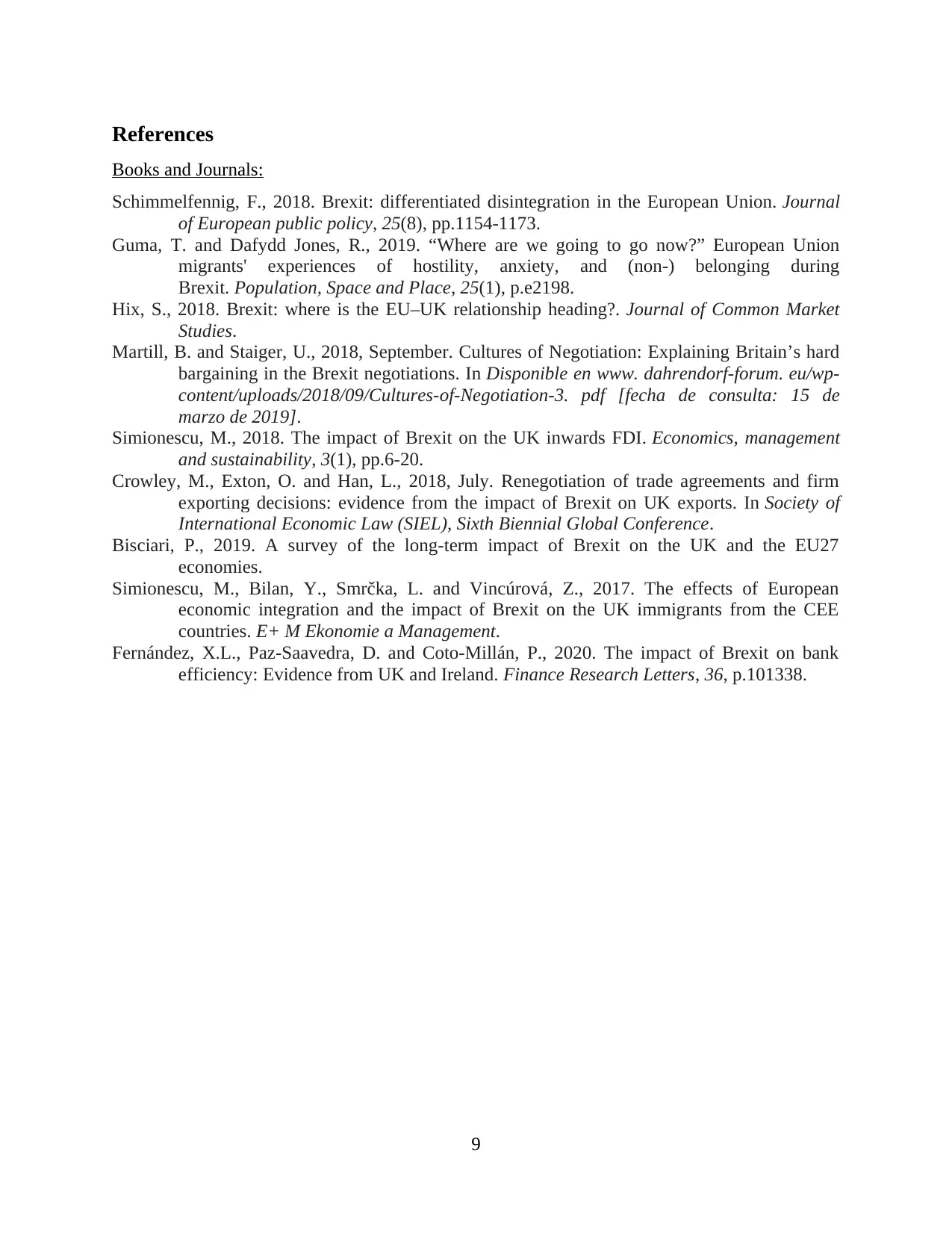
References
Books and Journals:
Schimmelfennig, F., 2018. Brexit: differentiated disintegration in the European Union. Journal
of European public policy, 25(8), pp.1154-1173.
Guma, T. and Dafydd Jones, R., 2019. “Where are we going to go now?” European Union
migrants' experiences of hostility, anxiety, and (non‐) belonging during
Brexit. Population, Space and Place, 25(1), p.e2198.
Hix, S., 2018. Brexit: where is the EU–UK relationship heading?. Journal of Common Market
Studies.
Martill, B. and Staiger, U., 2018, September. Cultures of Negotiation: Explaining Britain’s hard
bargaining in the Brexit negotiations. In Disponible en www. dahrendorf-forum. eu/wp-
content/uploads/2018/09/Cultures-of-Negotiation-3. pdf [fecha de consulta: 15 de
marzo de 2019].
Simionescu, M., 2018. The impact of Brexit on the UK inwards FDI. Economics, management
and sustainability, 3(1), pp.6-20.
Crowley, M., Exton, O. and Han, L., 2018, July. Renegotiation of trade agreements and firm
exporting decisions: evidence from the impact of Brexit on UK exports. In Society of
International Economic Law (SIEL), Sixth Biennial Global Conference.
Bisciari, P., 2019. A survey of the long-term impact of Brexit on the UK and the EU27
economies.
Simionescu, M., Bilan, Y., Smrčka, L. and Vincúrová, Z., 2017. The effects of European
economic integration and the impact of Brexit on the UK immigrants from the CEE
countries. E+ M Ekonomie a Management.
Fernández, X.L., Paz-Saavedra, D. and Coto-Millán, P., 2020. The impact of Brexit on bank
efficiency: Evidence from UK and Ireland. Finance Research Letters, 36, p.101338.
9
Books and Journals:
Schimmelfennig, F., 2018. Brexit: differentiated disintegration in the European Union. Journal
of European public policy, 25(8), pp.1154-1173.
Guma, T. and Dafydd Jones, R., 2019. “Where are we going to go now?” European Union
migrants' experiences of hostility, anxiety, and (non‐) belonging during
Brexit. Population, Space and Place, 25(1), p.e2198.
Hix, S., 2018. Brexit: where is the EU–UK relationship heading?. Journal of Common Market
Studies.
Martill, B. and Staiger, U., 2018, September. Cultures of Negotiation: Explaining Britain’s hard
bargaining in the Brexit negotiations. In Disponible en www. dahrendorf-forum. eu/wp-
content/uploads/2018/09/Cultures-of-Negotiation-3. pdf [fecha de consulta: 15 de
marzo de 2019].
Simionescu, M., 2018. The impact of Brexit on the UK inwards FDI. Economics, management
and sustainability, 3(1), pp.6-20.
Crowley, M., Exton, O. and Han, L., 2018, July. Renegotiation of trade agreements and firm
exporting decisions: evidence from the impact of Brexit on UK exports. In Society of
International Economic Law (SIEL), Sixth Biennial Global Conference.
Bisciari, P., 2019. A survey of the long-term impact of Brexit on the UK and the EU27
economies.
Simionescu, M., Bilan, Y., Smrčka, L. and Vincúrová, Z., 2017. The effects of European
economic integration and the impact of Brexit on the UK immigrants from the CEE
countries. E+ M Ekonomie a Management.
Fernández, X.L., Paz-Saavedra, D. and Coto-Millán, P., 2020. The impact of Brexit on bank
efficiency: Evidence from UK and Ireland. Finance Research Letters, 36, p.101338.
9
⊘ This is a preview!⊘
Do you want full access?
Subscribe today to unlock all pages.

Trusted by 1+ million students worldwide
1 out of 9
Related Documents
Your All-in-One AI-Powered Toolkit for Academic Success.
+13062052269
info@desklib.com
Available 24*7 on WhatsApp / Email
![[object Object]](/_next/static/media/star-bottom.7253800d.svg)
Unlock your academic potential
Copyright © 2020–2026 A2Z Services. All Rights Reserved. Developed and managed by ZUCOL.





